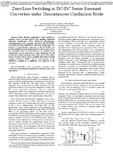Zero-loss switching in DC-DC series resonant converters under discontinuous conduction mode
Fecha
2021Versión
Acceso abierto / Sarbide irekia
Tipo
Contribución a congreso / Biltzarrerako ekarpena
Versión
Versión aceptada / Onetsi den bertsioa
Identificador del proyecto
Impacto
|
|
10.1109/EEEIC/ICPSEurope51590.2021.9584513
Resumen
Many thriving applications where isolation is required, such as traction and EV fast charging, implement solid-state transformers (SST). Half-cycle discontinuous-conduction-mode series resonant converters (HC-DCM-SRC) are suitable for these applications. The focus of this paper is to perform a comprehensive approach to HC-DCM-SRC and provide straight-forward requirements in order to ensure zero-l ...
[++]
Many thriving applications where isolation is required, such as traction and EV fast charging, implement solid-state transformers (SST). Half-cycle discontinuous-conduction-mode series resonant converters (HC-DCM-SRC) are suitable for these applications. The focus of this paper is to perform a comprehensive approach to HC-DCM-SRC and provide straight-forward requirements in order to ensure zero-loss switching (ZLS) of semiconductors. In addition, these requirements can be expressed as design boundaries for the transformer. Finally, the paper shows that, due to ZLS, silicon devices may have larger power capability than silicon-carbide switches. Therefore, IGBTs can be used instead of SiC MOSFETs, resulting in a significant cost reduction of the converter. [--]
Materias
DC-DC power conversion,
Resonant power conversion,
Soft-switching,
Discontinuous conduction mode,
Power transformers
Editor
IEEE
Publicado en
Dicorato, M. (Ed.).: 2021 IEEE International Conference on Environment and Electrical Engineering and 2021 IEEE Industrial and Commercial Power Systems Europe. IEEE, 2021, 1 - 6, 978-1-6654-3612-0
Departamento
Universidad Pública de Navarra. Departamento de Ingeniería Eléctrica, Electrónica y de Comunicación /
Nafarroako Unibertsitate Publikoa. Ingeniaritza Elektrikoa, Elektronikoa eta Telekomunikazio Ingeniaritza Saila /
Universidad Pública de Navarra/Nafarroako Unibertsitate Publikoa. Institute of Smart Cities - ISC
Versión del editor
Entidades Financiadoras
This work was supported by the Spanish State Research Agency (AEI) under grant PID2019-110956RB-I00 and by the Public University of Navarre (UPNA) under a PhD scholarship






